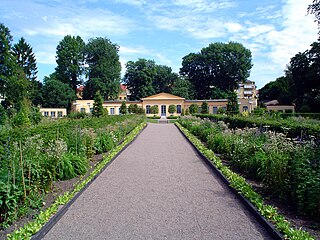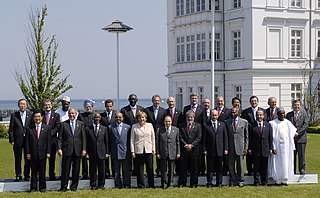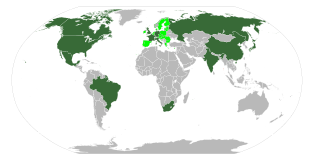
British Standards (BS) are the standards produced by the BSI Group which is incorporated under a royal charter and which is formally designated as the national standards body (NSB) for the UK. The BSI Group produces British Standards under the authority of the charter, which lays down as one of the BSI's objectives to:
Set up standards of quality for goods and services, and prepare and promote the general adoption of British Standards and schedules in connection therewith and from time to time to revise, alter and amend such standards and schedules as experience and circumstances require.

The Bank for International Settlements (BIS) is an international financial institution owned by central banks that "fosters international monetary and financial cooperation and serves as a bank for central banks". The BIS carries out its work through its meetings, programmes and through the Basel Process – hosting international groups pursuing global financial stability and facilitating their interaction. It also provides banking services, but only to central banks and other international organizations. It is based in Basel, Switzerland, with representative offices in Hong Kong and Mexico City.

The Group of Eight (G8) was an inter-governmental political forum from 1997 until 2014. It had formed from incorporating the country of Russia into the Group of Seven, or G7, and returned to its previous name after Russia was removed in 2014.

The International Code of Nomenclature for algae, fungi, and plants (ICN) is the set of rules and recommendations dealing with the formal botanical names that are given to plants, fungi and a few other groups of organisms, all those "traditionally treated as algae, fungi, or plants". It was formerly called the International Code of Botanical Nomenclature (ICBN); the name was changed at the International Botanical Congress in Melbourne in July 2011 as part of the Melbourne Code which replaced the Vienna Code of 2005.

Hans Eichel is a German politician (SPD) and the co-founder of the G20, or "Group of Twenty", an international forum for the governments and central bank governors of twenty developed and developing nations to discuss policy issues pertaining to the promotion of international financial stability.

The Group of Seven (G7) is an inter-governmental political forum consisting of Canada, France, Germany, Italy, Japan, the United Kingdom and the United States. In addition, the European Union is a 'non-enumerated member'. Its members are the world's largest IMF advanced economies and liberal democracies; the group is officially organized around shared values of pluralism and representative government. As of 2020, the collective group accounts for over 50 percent of global net wealth, 32 to 46 percent of global gross domestic product, and approximately 770 million people or 10 percent of the world's population. Members are great powers in global affairs and maintain mutually close political, economic, social, legal, environmental, military, religious, cultural, and diplomatic relations. From 2022, Germany has taken over the rotating presidency of the G7, following the presidency of the United Kingdom.

Dissent! was the name taken for an international network of local groups, which came together to organise opposition to the G8 summit held in Gleneagles Hotel, Perthshire, Scotland in July 2005. Most groups shared an anti-capitalist orientation and anti-authoritarian organizing methods and the network declares itself to be open to anyone prepared to work within the Hallmarks of Peoples' Global Action, an international co-ordination of radical social movements and grassroots campaigns. Dissent acted as a networking tool and created infrastructure which was used by groups with methods of protest ranging from anti-border city tours and street parties to road blockades, graffiti and confrontations with the police.
The Group of 22 was announced by the leaders of APEC in 1997. The intention was to convene a number of meetings between finance ministers and central bank governors to make proposals on reform of the global financial system. The Group of 22 comprised members of the then-G8 and 14 other countries. It first met in 1998 in Washington, D.C., US, to consider the stability of the international financial system and capital markets. In 1999, it was superseded by the Group of 33, which itself was superseded by the Group of 20 (G-20) later that year.

The Intergovernmental Group of Twenty-Four on International Monetary Affairs and Development, or The Group of 24 (G-24) was established in 1971 as a chapter of the Group of 77 in order to help coordinate the positions of developing countries on international monetary and development finance issues, as well as and to ensure that their interests are adequately represented in negotiations on international monetary matters. Though originally named after the number of founding Member States, it now has 28 Members. Although the G-24 officially has 28 member countries, any member of the G-77 can join discussions.

The G20 or Group of Twenty is an intergovernmental forum comprising 19 countries and the European Union (EU). It works to address major issues related to the global economy, such as international financial stability, climate change mitigation, and sustainable development.
A summit meeting is an international meeting of heads of state or government, usually with considerable media exposure, tight security, and a prearranged agenda. Notable summit meetings include those of Franklin D. Roosevelt, Winston Churchill, and Joseph Stalin during World War II. However, the term summit was not commonly used for such meetings until the Geneva Summit (1955). During the Cold War, when American presidents joined with Soviet or Chinese counterparts for one-on-one meetings, the media labelled the event as a "summit". The post–Cold War era has produced an increase in the number of "summit" events. Nowadays, international summits are the most common expression for global governance.
The Council of Australian Postgraduate Associations (CAPA) is the peak representative body for postgraduate students in Australia. CAPA's members are 33 postgraduate associations and the National Aboriginal & Torres Strait Islander Postgraduate Association (NATSIPA). CAPA provides member associations with representation to the Federal government, and peak bodies such as the Australian Research Council and Universities Australia, on issues affecting postgraduate students in Australia. In 2017, Australia had over 400,000 postgraduate students, representing one quarter of all tertiary students in Australia.
Group of 33 has been used to refer to two different international groupings:

The 33rd G8 summit was held at Kempinski Grand Hotel, 6–8 June 2007. The summit took place in Heiligendamm in the Northern German state of Mecklenburg-Vorpommern on the Baltic Coast. The locations of previous G8 summits to have been hosted by Germany include Bonn, Munich (1992) and Cologne (1999).

The 25th G8 Summit was held in Cologne, Germany, on June 18–20, 1999. The venue for this summit meeting was the Museum Ludwig in the central city.
The 15th G7 Summit was held in the business district of La Défense to the west of Paris, France between July 14 to 16, 1989. The venue for the summit meetings was the Grande Arche which was rushed to completion for celebrations marking the bicentennial of the French Revolution and for the world economic summit meeting that was held in the top of the Arche. This event was also called the "Summit of the Arch."

The Group of Eight + Five (G8+5) was an international group that consisted of the leaders of the heads of government from the G8 nations, plus the heads of government of the five leading emerging economies. In March 2014, Russia was cast out of the Group of 8 due to its involvement in the 2014 Crimea crisis in Ukraine, so the G8+5 in its original form is unlikely to reconvene with Russia present.
The 1934 Montreux Fascist conference, also known as the Fascist International Congress, was a meeting held by deputies from a number of European Fascist organizations. The conference was held on 16–17 December 1934 in Montreux, Switzerland. The conference was organised and chaired by the Comitati d'Azione per l'Universalità di Roma.
The IBM HPC Systems Scientific Computing User Group (ScicomP) is an international organization open to all scientific and technical users of IBM systems. At yearly meetings application scientists and staff from HPC centers present talks about, and discuss, ways to develop efficient and scalable scientific applications. These meetings provide an opportunity to give feedback to IBM that will influence the design of future systems. ScicomP is a not-for-profit group and is not affiliated with IBM Corporation.
The IAAF Grand Prix was an annual, global circuit of one-day outdoor track and field competitions organized by the International Association of Athletics Federations (IAAF). It was created in 1985 as the IAAF's first seasonal track and field circuit and lasted until 2009. Athletes scored points based on their performances on the circuit and the top athletes were invited to the annual IAAF Grand Prix Final.












